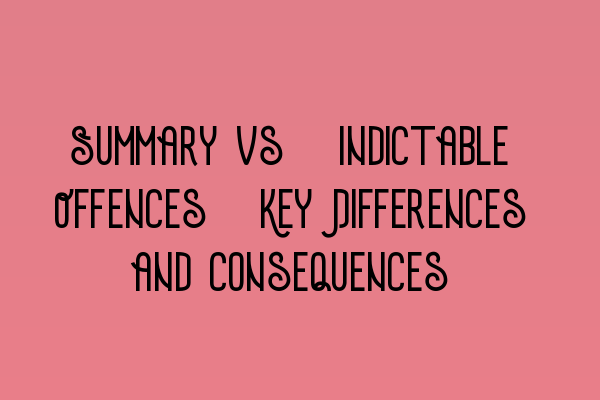Summary vs. Indictable Offences: Key Differences and Consequences
Introduction
When it comes to criminal law in the United Kingdom, offenses can be broadly categorized into two types: summary offenses and indictable offenses. Understanding the key differences between these two categories is crucial as it determines the potential consequences an individual may face. In this article, we will explore the distinctions between summary and indictable offenses and discuss their respective consequences.
Summary Offenses
Summary offenses, also known as summary-only offenses, are less serious criminal offenses that are typically heard in the Magistrates’ Court. These offenses, such as minor theft, public disorder, and traffic offenses, are generally dealt with through a summary trial. Summary offenses are usually punishable by a maximum of 6 months imprisonment and/or a fine.
Indictable Offenses
Indictable offenses, on the other hand, are more serious criminal offenses that are usually heard in the Crown Court before a judge and jury. These offenses, such as murder, sexual assault, and fraud, carry heavier penalties due to their gravity. The potential consequences for indictable offenses depend on the specific offense committed, but they can range from imprisonment to life sentences.
Differences between Summary and Indictable Offenses
There are several key differences between summary and indictable offenses:
- Severity: Summary offenses are generally less serious in nature, while indictable offenses are of a more serious nature and can lead to more severe penalties.
- Trial Proceedings: Summary offenses are usually tried in the Magistrates’ Court, whereas indictable offenses are tried in the Crown Court.
- Jurisdiction: Magistrates’ Courts have limited jurisdiction to handle summary offenses, while the Crown Court has broader jurisdiction to deal with indictable offenses.
- Right to Trial by Jury: Indictable offenses generally provide the right to trial by jury, ensuring a fair and impartial trial, whereas summary offenses are typically heard by a magistrate.
- Potential Penalties: As mentioned earlier, summary offenses carry lesser penalties compared to indictable offenses, which can result in more severe punishments, including longer prison sentences.
Consequences
The consequences of being charged with a summary or indictable offense can have significant repercussions on an individual’s personal and professional life. Depending on the offense committed, the consequences may include:
- Fines
- Community service
- Probation
- Restraining orders
- Loss of driving privileges
- Imprisonment
- Life sentences
Conclusion
Understanding the differences between summary and indictable offenses is essential for individuals involved in criminal law matters. Whether you are facing charges or seeking legal advice, it is crucial to consult a professional criminal law solicitor who can guide you through the intricacies of the legal process. For comprehensive preparation, consider enrolling in SQE 1 and SQE 2 Preparation Courses offered by SQE Criminal Law & Practice Law UK.
For SQE 1 Practice Exam Questions, check out our MCQ Practice Quiz.
Prepare for SQE 1 with our practice mocks FLK1 and FLK2. Take a look at our SQE 1 Practice Mocks FLK1 FLK2.
If you’re looking for SQE 2 preparation courses, we offer comprehensive courses tailored to your needs. Check out our SQE 2 Preparation Courses.
For detailed information about SQE 1 and exam dates, visit our page on SRA SQE Exam Dates.
